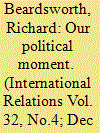| Srl | Item |
| 1 |
ID:
082351


|
|
|
|
|
| Publication |
2008.
|
| Summary/Abstract |
This article considers Patricia Owens' Between War and Politics in the light of its important critique of political moralism. For Owens, following Arendt, the instrumental use of violence in the political domain is dangerous if it serves abstract ends. The moral 'wars' of neo-conservatism and humanitarian interventionism embody this danger. I argue that this conflation of neo-conservative foreign policy and progressive liberalism is misguided, it underestimates the latter's increasing mediations between norm, legality and power. A critique of present moralization of politics should emphasize codification of rights to delimit the procedural framework within which international intervention can be made legitimate
|
|
|
|
|
|
|
|
|
|
|
|
|
|
|
|
| 2 |
ID:
175169


|
|
|
|
|
| Summary/Abstract |
This article considers what is necessary politically to respond to the empirical challenge of climate change and to the present calls of climate science (a carbon-neutral world by 2050). Its basic argument is that, among an array of national and international actors, it remains the state that can drive a successful politics of climate change. Without the heavy-lifting of the state and the state’s ability as a national entity to motivate behavioural change, neither the daunting scale nor imminent time-horizon of climate mitigation and adaptation is possible. The article shows how this specific argument, far from pitching anew nationalism against internationalism, can bring the two presently polarized movements together. The article then suggests that if these arguments are essentially valid, the discipline of International Relations needs to focus much more on the climate challenge, re-engage with its traditions of thought on the state and help harbour a specific disposition or mindset in the research and teaching of the discipline for the next decades: a fierce optimism.
|
|
|
|
|
|
|
|
|
|
|
|
|
|
|
|
| 3 |
ID:
163097


|
|
|
|
|
| Summary/Abstract |
National interest and national security need to be reconfigured so as to accommodate a state’s response to global threats and challenges. This requires in turn addressing the following paradox: the pooling and ceding of sovereignty must be made in the very name of national sovereignty. The article maintains that it is one of the foremost challenges of political responsibility and political leadership today to assume this paradox and thereby align national and global interests and practices. The alignment can, it is suggested, effectively oppose sovereigntism and nationalism, on one hand, and abstract global governance, on the other. To promote this alignment, the article advances a renewed understanding of state responsibility to citizenship under conditions of globalization.
|
|
|
|
|
|
|
|
|
|
|
|
|
|
|
|
| 4 |
ID:
113852


|
|
|
|
|
| Publication |
2012.
|
| Summary/Abstract |
International Relations theory does not distinguish enough between prediction and vision, and, as a result, retreats unduly from practice. This article argues for the importance of political vision in the study of international relations by complicating the standard social science distinction between fact and value. Using Nietzschean genealogy, it argues for a dual relationship between the normative and the empirical: the deduction of norms from the constraints of history; and the normative, proactive responses to this history within these constraints. This dual relationship underscores the importance of political vision and political leadership in the study of international politics. The article then analyses present historical challenges and suggests several normative responses to them that can be understood in the terms of 'political vision' in International Relations. It finally takes the example of the present absence of vision and leadership in the European Union and argues for a political Europe, the Union as a political power.
|
|
|
|
|
|
|
|
|
|
|
|
|
|
|
|